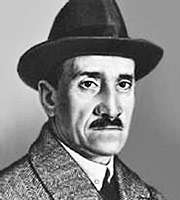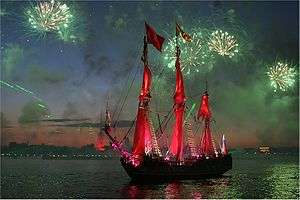Alexander Grin
Aleksandr Stepanovich Grinevsky (better known by his pen name, Aleksandr Grin, Russian: Александр Грин, IPA: [ɐlʲɪˈksandr ɡrʲin] (![]()
Alexander Grin | |
|---|---|
 | |
| Born | Alexander Grinevsky 23 August 1880 Vyatka |
| Died | 8 July 1932 (aged 51) Stary Krym |
| Occupation | Writer |
| Language | Russian |
| Citizenship | USSR |
| Period | 1906—1932 |
| Spouse | Vera Abramova Nina Grin |
Biography
Aleksandr Grin was born Aleksandr Stepanovich Grinevsky (Russian: Александр Степанович Гриневский) in a suburb of Vyatka in 1880, the son of the Pole Stefan Hryniewski (russianized as Stefan Grinevsky), deported after the January Uprising of 1863, and a Russian nurse Anna Lyapkova.[2] In 1896, after graduating from a school in Vyatka, Grinevsky went to Odessa and lived the life of a vagabond.[1] He worked as a sailor, gold miner, construction worker, but often found himself without a job and sustained himself by begging and thanks to money sent to him by his father.
After joining the Russian army, he became a member of the Socialist-Revolutionary Party, was arrested, and spent time in jail for "revolutionary propaganda". His first short story was published in a newspaper in 1906. In the same year he was arrested in Saint Petersburg and sentenced to four years of exile in a remote area of Tobolsk Governorate. However, very soon after arriving to Tobolsk, Grin escaped and returned to Petersburg to live illegally. He was again arrested in 1910 and sent to live in Arkhangelsk Governorate. In a small village called Kegostrov,[3] Grin and his first wife Vera Pavlovna Abramova (whom he married in 1910) lived from 1910 to 1912.
In 1912, he returned to Saint Petersburg and divorced his wife. At that time, Grin published mostly short stories; most of his larger works were written after the October revolution and enjoyed significant popularity in the first half of the 1920s. In 1921, he married Nina Nikolaevna Grin.[4] In 1924, they moved to Feodosiya to live near the sea. In his late days, Grin's romantic visions were in stark conflict with the mainstream Soviet literature; publishers in Moscow and Leningrad refused to consider his romantic writings, and Grin and his wife lived in extreme poverty. Grin suffered from alcoholism and tuberculosis which eventually ruined his health. He died of stomach cancer in 1932 in Stary Krym.[5]
In his book Sculpting in Time, filmmaker Andrei Tarkovsky describes how Grin, when dying of hunger, "went off into the mountains with a home-made bow and arrow to shoot some sort of game." He offers Grin as an example of a poet in the deepest sense: one with "an awareness of the world, a particular way of relating to reality... a philosophy to guide a man throughout his life."[6]
Works

Most of Alexander Grin's writings bear no direct relation to the reality of Imperial and Soviet Russia that he lived in. The setting of most of his novels and short stories is an unnamed land by the sea, apparently far from Europe but with all characters being Western European in name and appearance. Even his literary pseudonym (Grin) is a de-Russified form of his real last name (Grinevsky).
Described by some critics as "adolescent fiction",[7] Grin's works have many things in common with the reality of the early 20th century (such as automobiles and banks). Populated by sea captains, sailors, scientists, travelers, criminals, extravagant aristocrats, childlike girls, elegant villains, and strong-spirited heroes who always stay true to their dreams, Grin's world is often referred to as Grinlandia by fans. Some of his novels contain an element of magic – not as an established part of his world, but always as a miracle that changes the lives of those who encounter it.
Bibliography
The most notable of his novels include:
- Scarlet Sails (Алые паруса, 1923), a simple but powerful love story, perhaps the most famous of Grin's works. It was made into a 1961 film, when during the Khrushchev Thaw, Grin's works enjoyed a revival of popularity.
- The Shining World (Блистающий мир, 1923)
- The Golden Chain (Золотая цепь, 1925)
- She Who Runs on the Waves (Бегущая по волнам, 1928)
- Jessie and Morgiana (1929, Wikisource: Джесси и Моргиана). It was made into a Czechoslovak film Morgiana in 1972.[8]
- The Road to Nowhere (Дорога никуда, 1930)
Books
- Selected Short Stories. Translated by Nicholas Luker. Ann Arbor, Mich.: Ardis Publishers.
- Fandango and Other Stories. Translated by Bryan Karetnyk. New York: Columbia University Press.
Adaptations
- Watercolor (1958), directed by Otar Iosseliani
- Scarlet Sails (1961), directed by Alexandr Ptushko
- The Lanfier Colony (1969), directed by Jan Schmidt
- Morgania (1972), directed by Juraj Herz
- The Rat Savior (1976), directed by Krsto Papić
- The Shining World (1984), directed by Bulat Mansurov
- Mister Designer (1988), directed by Oleg Teptsov
- She Who Runs on the Waves (2007), directed by Valery Pendrakovskiy
References
- The Soviet Union, A Biographical Dictionary, Macmillan, NY, 1990.
- Alexei Varlamov (2010). Aleksandr Grin. Biography. Moscow: Eksmo, 544 pages. ISBN 978-5-699-38651-2
- "Keg-Ostrov, Russia – Geographical Names, map, geographic coordinates". www.geographic.org. Retrieved 11 August 2018.
- "Грин (Миронова) Нина Николаевна – История на сайте Бессмертный барак". Retrieved 11 August 2018.
- "Archived item". Archived from the original on 2007-09-27. Retrieved 2007-04-01.
- Andrei Tarkovsky, Sculpting in Time (Austin: University of Texas Press, 1967) p.21
- Crossover Fiction: Global and Historical Perspectives, Sandra L. Beckett
- Morgiana at IMDb.
External links
| Wikimedia Commons has media related to Alexander Grin. |
| Wikisource has original works written by or about: Alexander Grin |
- NYT Review of Grin's English translation
- The road to nowhere, a road to glory: Vladimir Nabokov and Aleksandr Grin.(Critical Essay), by Margarit Tadevosyan, in The Modern Language Review, April 2005
- Dictionary of Literary Biography on Aleksandr Stepanovich Grin
- Most of Grin's works in Russian, as well as some English translations
- Grinlandia, a fan site
- Grin's museum in Vyatka
- The English translation of Scarlet Sails by Helen Sharif